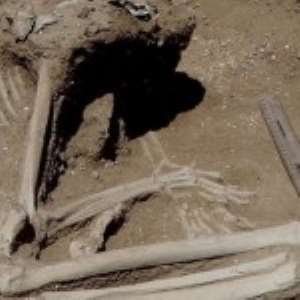
One skeleton was found in a position suggesting her wrists may have been bound
Archaeologists say they have unearthed the earliest evidence of warfare between hunter-gatherers, at a site in northern Kenya.
The 10,000-year-old remains of 27 people found at a remote site west of Lake Turkana show that they met violent deaths.
They were left to die there rather than being buried.
Many experts have argued that conflict only came about as humans became more settled.
These people, by contrast, were apparently nomadic hunter-gatherers.
The archaeologists, who have been working on the site at Nataruk since 2012, discovered that the victims were clubbed or stabbed to death in a single event.
The dead included male and female adults, as well as children.
.
The evidence, published in the journal Nature , does not reveal exactly what happened but the fact that so many people died at the same time suggests it was the result of “some sort of conflict”, according to Cambridge University Professor Robert Foley.
It is believed that the group was attacked by rival hunter-gatherers armed with wooden clubs and arrows or spears tipped with sharpened obsidian, a rare black volcanic rock.
 Arrowheads
Arrowheads
Arrowheads made of glass-like volcanic rock obsidian were found at the site
Speculating on the causes of the attack, Marta Mirazon Lahr, who led the Nataruk study, said the “massacre may have resulted from an attempt to seize resources… whose value was similar to those of later food-producing agricultural societies, among whom violent attacks on settlements became part of life”.
Many experts have argued that conflicts only arise “once people have things worth fighting over, [such as] herds of livestock, stores of grain… things that you can both defend and attack,” Professor Foley told the BBC’s Newsday radio programme.
It has been assumed that hunter-gatherers were less likely to engage in such conflicts because they can move away, but the Nataruk find shows that “before we have settled life, groups were competing over resources”, Professor Foley added.
-bbc




 Meta releases new version of conversational AI across its platforms
Meta releases new version of conversational AI across its platforms
 Cape Town named Africa’s Best Airport 2024 by Skytrax
Cape Town named Africa’s Best Airport 2024 by Skytrax
 Bono East: Four injured after hearse transporting corpse crashes into a truck
Bono East: Four injured after hearse transporting corpse crashes into a truck
 ‘Be courageous, find your voice to defend our democracy’ — Sam Jonah urges journ...
‘Be courageous, find your voice to defend our democracy’ — Sam Jonah urges journ...
 Exodus of doctors, nurses and teachers have worsened because of unserious Akufo-...
Exodus of doctors, nurses and teachers have worsened because of unserious Akufo-...
 2024 election: Avoid insults, cutting down people in search of power – National ...
2024 election: Avoid insults, cutting down people in search of power – National ...
 ‘You passed through the back door but congratulations’ — Atubiga on Prof Jane Na...
‘You passed through the back door but congratulations’ — Atubiga on Prof Jane Na...
 Government’s $21.1 billion added to the stock of public debt has been spent judi...
Government’s $21.1 billion added to the stock of public debt has been spent judi...
 Akufo-Addo will soon relocate Mahama’s Ridge Hospital to Kumasi for recommission...
Akufo-Addo will soon relocate Mahama’s Ridge Hospital to Kumasi for recommission...
 We must not compromise on our defence of national interest; this is the time to ...
We must not compromise on our defence of national interest; this is the time to ...
